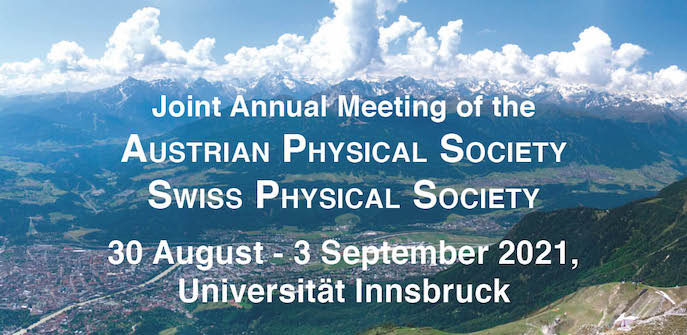Abstracts can be submitted for all sessions listed below. The choice between an oral or a poster presentation of your contribution is possible. Further instructions are available in the abstract submission form.
Info on talk lengths
The standard length for a contributed talk is 15 min (12+3), for an invited talk 30 min (25+5). The session organisers might extend or shorten talks where necessary. Refer to the schedule once it will be available.
Theoretical Physics
Theoretical contributions are highly encouraged and will be included directly in a corresponding topical session. This way, the sessions will profit from a broad range of experimental, phenomenological, and theoretical advancements that are relevant in the specific topical field and thus can engage in broader and deeper discussions.
Please submit your abstract to the session which best matches your topic. You can optionally mark your contribution as "theoretical" in the submission interface.
Contact: Philippe Jetzer (jetzer@physik.uzh.ch)
-
Applied Physics and Plasma Physics
-
Atomic Physics and Quantum Optics
-
Biophysics, Medical Physics and Soft Matter
-
Condensed Matter Physics (KOND)
The condensed matter program welcomes contributions from all topics within Condensed Matter Physics, including magnetism, superconductivity, semiconductors and more. For abstracts in the field of Surfaces, Interfaces and Thin Films, please submit your abstract to the corresponding session.
Contact: Henrik M. Rønnow (henrik.ronnow@epfl.ch), Alberta Bonanni (alberta.bonanni@jku.at)
-
History and Philosophy of Physics
-
Nuclear, Particle- and Astrophysics (FAKT - TASK)
-
Physik und Schule & Young Minds
-
Quantum Information and Quantum Computing
BeyondC is a special research programme (SFB) consisting of 12 research groups in Austria and Germany applying theoretical and experimental expertise to develop and exploit new methods and tools to describe, characterize, validate, and manipulate quantum systems in order to achieve the experimental regime of quantum systems for quantum superiority.
Oral and poster contributions fitting the scope of this session are also welcome from groups (Austrian or Swiss) which are not organised within BeyondC.Contact: Andrea Stepper, SFB BeyondC Office (beyondc@univie.ac.at)
-
Start-ups: From great physics to innovative products
Has anyone ever approached you during your Master’s or PhD thesis and asked if they “could also have one of those XYZ” that you have built? (“XYZ” = quantum sensor, laser, control electronics, you name it). Then you should definitely think about taking your work to the next level. In this year's session of the “Physics in Industry” section we will be looking with several invited speakers at what is needed to recognize and mature great ideas in a physics and engineering context and bring them to market. If you are in a physics-related start-up and have an exciting story to tell, please submit your abstract before the submission deadline.
Contact: Andreas Fuhrer (afu@zurich.ibm.com), Thilo Stöferle (tof@zurich.ibm.com), Peter Korczak (peter.korczak@aon.at)
-
Surfaces, Interfaces and Thin Films
-
Special: 450th Anniversary of Johannes Kepler (1571-1630)
Modern science begins with Kepler's laws of planetary motion with great impact on Astronomy and Physics until today. The laws were set up by him in the years about 1600 in Prague on the basis of Tycho Brahe's observation data and using the mathematical, but also technical tools of the Swiss Jost Bürgi.
Peter Ullrich, Uni Koblenz will remember in his talk Kepler, Brahe, and Bürgi: To measure and calculate the celestial bodies on this fruitful cooperation of three extraordinary scientists. The second talk presented by Arnold Hanslmeier, Uni Graz, Johannes Kepler – From the planets to dark matter, will show that Kepler’s pioneering findings continue to shape science to this day.

